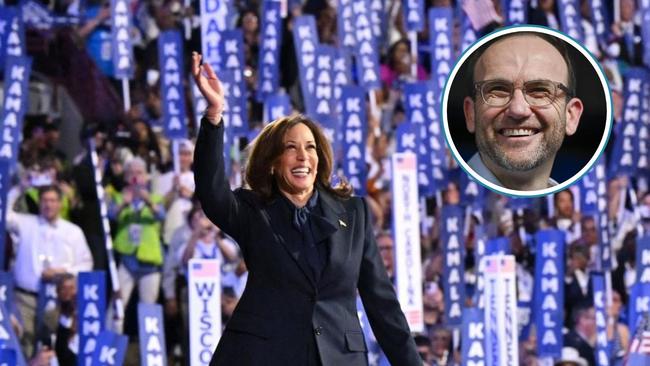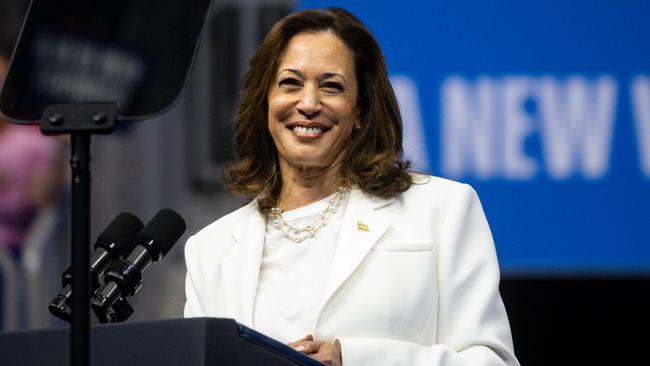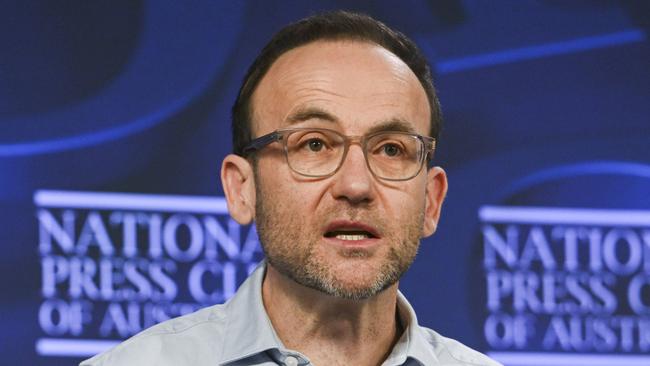
Since the days of Sherwood Forest, there are few examples of this “Robin Hood”-style attack on the capital system.
Directors and managers of large companies in both countries, plus the wealthy, assume that voters will reject these “radical” solutions to community suffering but current opinion polls tell a different story.
The polls predict that parties planning those attacks will either control or be very powerful in the parliaments that will follow looming elections.
Sharemarkets concentrate on inflation and interest rates and have not yet focused on these developments, which have the potential to substantially reduce the profitability of US and Australian companies and slash the rewards for investing.
In the US the proposed wealth transfer comes from the Democrats’ Kamala Harris and in Australia from the Greens’ Adam Bandt. The Australian Greens who could easily have the balance of power.
The ALP’s wealth attack comes via 700 pages of industrial legislation to lower profitability by reducing productivity and increasing wages. But Treasurer Jim Chalmers also plans to hit the wealthy via an unrealised capital gains tax ---- an idea Harris has picked up on but her version is much less vicious that the Chalmers plan.
Overall Harris would increase corporate and wealth taxes by about $US5 trillion ($3.4 trillion) over the next decade and cut other taxes and increase benefits by more than $US4 trillion. The US government’s total collections — projected at $US63 trillion over 10 years — would be little changed, but the Harris agenda would shift who pays and receives --- the Robin Hood model.

Under Harris, company tax will rise from 22 to 28 per cent (Donald Trump will reduce it) and large companies would pay a 21 per cent minimum tax instead of the current 15 per cent. They also would pay higher taxes on foreign profits.
People with net worth exceeding $US100m really cop it.
Harris plans to tax their unrealised capital gains by a minimum of 25 per cent.
And the blows keep coming. Under Harris, capital gains for households making at least $US1m would be taxed as ordinary income. Unrealised capital gains, above $US5m per-person, would be taxed at death.
In Australia, current opinion polls have the Greens with the balance of power so given their policies are a version of Kamala Harris policies they must be taken seriously.
Greens leader Mr Bandt demands a $514bn tax hit on large listed companies in exchange for the Greens supporting the ALP in a hung parliament.
The Greens want a 40 per cent tax on excessive profits earned on turnover after the first $100m: a gas and oil tax via changes to the petroleum resource rent tax and a 40 per cent mining tax capturing coal and other mining but excluding lithium and nickel, which are deemed critical to the net zero transition.
Parliamentary Budget Office modelling commissioned by the Greens shows an excessive profits tax could raise about $65bn over the forward estimates, with $22.7bn raised from a coal and mining tax, and $33bn from an oil and gas tax.
Among those companies to face a 40 per cent tax rate are the big four banks, Wesfarmers, Telstra, Woolworths, Coles, JB Hi-Fi and Ampol, which have “extracted excessive profits over the past decade”. Among the wealth redistribution proposals are dental and mental heath on Medicare, wiping out student debt and free education.

Both the Harris and Greens proposals would lower the value of shares and property. The ALP’s attack on the capital system involves higher taxes on superannuation including unrealised gains.
The wealthy are defined as those as those with over $3m (not indexed) in superannuation and they must pay tax on unrealised gains.
The Harris attack concentres on those with much greater wealth. The ALP attacks all enterprises by lowering productivity and increasing wages via its industrial laws. No other western country would consider such an approach because this lifts inflation and keeps interest rate higher. The ALP wants to lift union membership.
John Dahlsen, head of one of Australia’s larger private companies Dahlsens and a former ANZ director, has issued an economic paper that shows that Australia’s gross domestic product (GDP) per capita is falling, so creating a decline in our overall standard of living.
He believes that even if prices flatten and interest rates fall, it will not significantly affect our falling standard of living.
On a geographical basis, parts of the country, like the western suburbs of Sydney and Melbourne, are clearly in recession. Sectors that are in recession include house building, hospitality, most small businesses but especially small retail.
So, in one way or another, most of Australia is in recession and there are no signs of this abating.
(I would add that given the economic difficulties the Green Robin Hood polices could be dangerous to both major parties but especially the ALP.)
Dahlsen points out that governments’ forecast expense rises in the current financial year include defence (6.5 per cent); education (7.2 per cent); health 15.3 (per cent); social security (36.3 per cent); and other services (18.8 per cent).
This cannot be matched by receipts and will only lead to more debt, probably for a decade or more.
FOOTNOTE: Some of the major donors to the Democrat campaign are among those hit hard by the Harris tax on unrealised gains. They are putting enormous pressure on her to abandon the tax. Overnight reports from New York say that she is thinking of a retreat. Take note Jim Chalmers.






In both the US and Australia the cost of living and other financial blows to ordinary people are causing significant political parties to plan unprecedented attacks on both large corporations and people with wealth invested in the share and property markets.